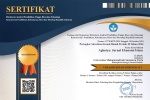Penyelesaian Non Performing Finance Di Lembaga Keuangan Syariah
Abstract
One of the risks faced by banks is the risk of unpaid credit that has been given to debtors or called credit risk. A risk due to failure or inability of the customer to return the amount of the loan received from the bank and its interest in accordance with a predetermined or scheduled period. Credit risk includes non-performing loans. Non-performing finance (NPL) is a problematic financing which cannot meet the payment of outstanding loans and margin / profit sharing within the agreed period of the agreement. There are three ways to settle NPLs that should be implemented by Islamic banks, namely shulh (peace), Tahkim (Abitrase Syariah), and Qadha (Court Institution). The approach of this research is a descriptive research approach, namely research that seeks to tell the problems that exist, by presenting, analyzing and interpreting the results of research. Technical data collection is done through interviews.
How to solve problem financing in Islamic financial institutions with Islamic law. That, the settlement was carried out in three ways, namely Shulh (peace), Tahkim (Syari'ah Arbitration), and Qadha (judicial institution). Shulh is done by sending messages via sms, telephone billing, through visits, notification letters, reprimand letters, one to three warning letters. While Tahkim is carried out by proposing peace by means of data, which presents a third party in solving the problem. And the last is Qadha, this is the last resort taken by bank muamalat in resolving problematic financing problems, by way of realization of restructuring, or giving information on the methods used by banks in making billing Islam.
Full Text:
PDFReferences
Antonio SyafiI Muhammad, Bank Syariah, Jakarta : Geman Insani, 2001..
Burhanuddin, Hukum Bisnis Syariah Yogyakarta: UII Press, 2011.
Departermen Agama Republik Indonesia, Al-Quran Dan Terjemahan.
Diakses melalui. http://gudangilmusyariah.blogspot.co.id/2014/09/pengertian-shulh-perdamaian.html. Pada tanggal 24 Februari 2016.
Diakses melalui. http://syariah99.blogspot.co.id/2013/05/dasar-dasar-pengertian-hukum-Islam.html. Pada tanggal 28 Oktober 2015.
Hadis dikutip dari buku karangan Ahmad Wardi Muslich, Jakarta : Amzah, 2010.
Ismail, Perbankan Syariah, Jakarta : Kencana, 2014.
Karim Adiwarman, Bank islam, Jakarta : Grafindo Persada, 2011.
Mardani, Fiqih Ekonomi Syariah, Jakarta : Kencana Pramedia, 2012.
Sugiono. Metode Penelitian Kuantitatif, Kualitatif dan R&D. Bandung : Alfabeta. 2009.
UU No. 10 tentang perbankan syariah.
DOI: https://doi.org/10.30596/aghniya.v1i1.2557
Refbacks
- There are currently no refbacks.
Aghniya: Jurnal Ekonomi Islam is licensed under a Creative Commons Attribution-ShareAlike 4.0 International License.
Aghniya: Jurnal Ekonomi Islam
Faculty of Islamic Religion,Universitas Muhammadiyah Sumatera Utara. Address: Kampus Utama Jl. Kapten Muchtar Basri No.3, Glugur Darat II,Medan Sumatera Utara-20238.
E-mail: aghniya@umsu.ac.id





